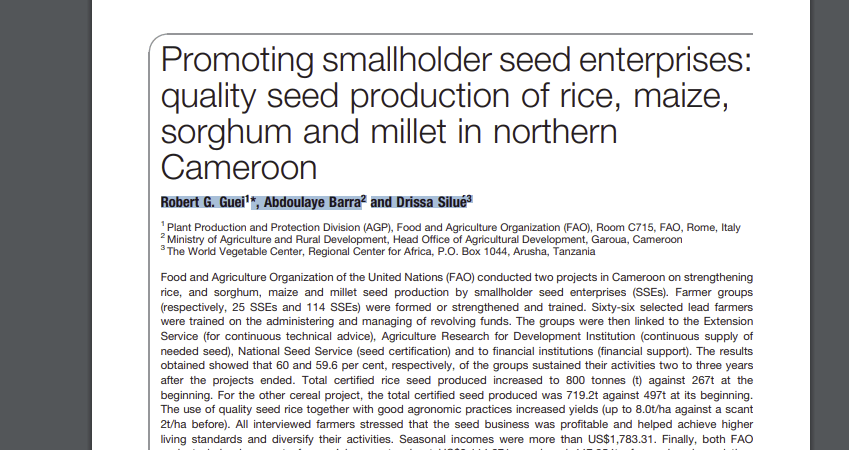Author: Robert G. Guei, Abdoulaye Barra and Drissa Silue´; 2011
Keywords: small seed enterprises; Cameroon; quality seed
Food and Agriculture Organization of the United Nations (FAO) conducted two projects in Cameroon on strengthening rice, and sorghum, maize and millet seed production by smallholder seed enterprises (SSEs).
Farmer groups (respectively, 25 SSEs and 114 SSEs) were formed or strengthened and trained. Sixty-six selected lead farmers were trained on the administering and managing of revolving funds. The groups were then linked to the Extension Service (for continuous technical advice), Agriculture Research for Development Institution (continuous supply of needed seed), National Seed Service (seed certification) and to financial institutions (financial support). The results obtained showed that 60 and 59.6 per cent, respectively, of the groups sustained their activities two to three years after the projects ended. Total certified rice seed produced increased to 800 tonnes (t) against 267t at the beginning. For the other cereal project, the total certified seed produced was 719.2t against 497t at its beginning. The use of quality seed rice together with good agronomic practices increased yields (up to 8.0t/ha against a scant 2t/ha before). All interviewed farmers stressed that the seed business was profitable and helped achieve higher living standards and diversify their activities. Seasonal incomes were more than US$1,783.31. Finally, both FAO projects helped generate farmers’ income to about US$2,114.871, produced 447,954t of cereal grain and thus improved food security and alleviated poverty. The Cameroonian success could be repeated elsewhere.
Click on the following link to access the content: https://www.fao.org/fileadmin/templates/agphome/documents/PGR/PubSeeds/Etudedecas_NordCameroun.pdf
© FAO

